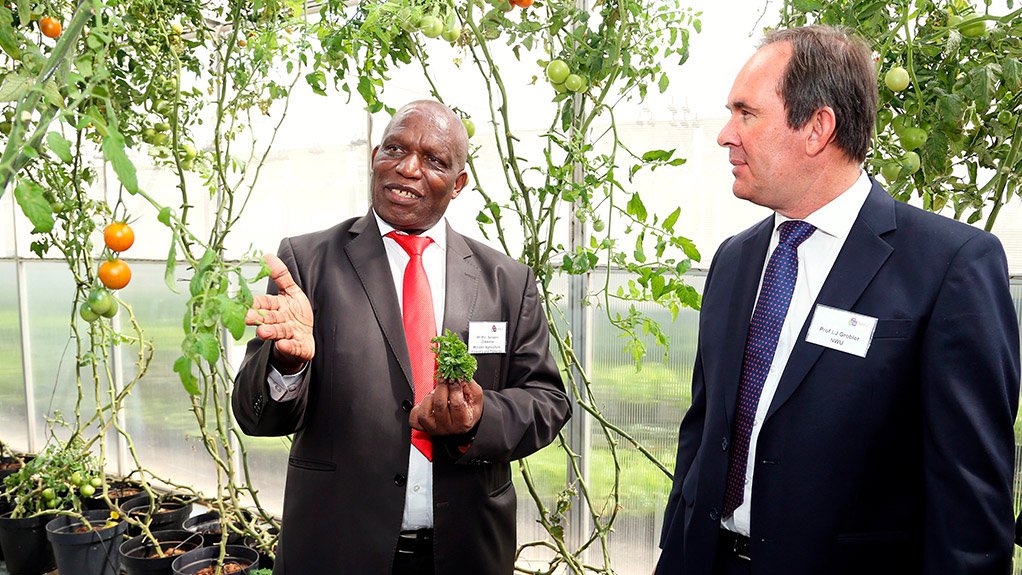The Department of Agriculture, Forestry and Fisheries (DAFF) has pledged its support for the SUNfarming Food & Energy project run by North-West University (NWU), in Potchefstroom, in the North West province, which promotes the growing of affordable and nutritious food in local municipalities, thereby effectively addressing household food and nutrition insecurity.
The project is a partnership between Germany-based photovoltaic (PV) specialist SUNfarming and NWU.
The project, which is cofinanced by the German government, focuses on the application of technological engineering solutions and takes traditional, small-scale vegetable farming to new heights.
Special so-called agrosolar greenhouse structures are used to grow vegetables, such as tomatoes, spinach, cauliflower, lettuce, cabbage, broccoli, onions and herbs. The project, which started production in June 2016, currently comprises three greenhouses, or tunnels.
While agricultural produce is grown, the solar panels mounted on top of the tunnels generate electricity.
Solar tunnel production offers much higher yields than conventional farming. No soil is required to grow the vegetables and water economy is increased through drip irrigation.
Through the project, several women from the local Ikageng community are being trained in cultivation methods, insect control, nutritional values of the different crops, root systems and harvesting techniques.
“We are no longer planting our vegetables using the soil, but coco fibre. Our system of farming saves water. Our vegetables pots are irrigated on time and we produce fresh vegetables,” Buni Maretlwa, one of the workers at SUNfarming, said.
NWU and SUNfarming donated the initial plants, fertiliser and compost and the revenue generated from the produce will enable the community members to sustainably grow produce for many production cycles.
At a site visit to the project last month, Agriculture, Forestry and Fisheries Minister Senzeni Zokwana said, in view of the project’s “innovative technology for agriculture”, the department wanted “to see this replicated in other parts of the country, as it effectively deals with the issue of climate change and the scarcity of water and land”, calling for a partnership between government, higher learning institutions and business.
Zokwana highlighted that initiatives such as these would help the department reach its goal of establishing one-million jobs in agriculture by 2030.
“Agriculture is the answer to various problems. We need a doctor or dentist or attorney several times a year, but we need a farmer at least three times a day. We must strive for friendlier methods of agricultural production. What NWU and SUNfarming are doing here is the answer to these challenges we are facing within the agriculture sector.
“What I saw today is the future of agriculture . . . It is important that these and other projects seek cooperation agreements with the private sector to expand it further across the province and the country,” the Minister said.
NWU Potchefstroom campus rector Professor Fika Janse van Rensburg said many communities would benefit from this initiative should it be rolled out on a bigger scale.
SUNfarming’s objective is to roll out the project to all universities and schools in Africa and it is collaborating with universities in Kenya, Ghana, Zambia and Botswana, besides other countries, to achieve this goal.
“Through the cooperation with African educational institutions, we seek to lay the groundwork for future investments and joint ventures between our company group and local communities in your country,” said SUNfarming founder Peter Schrum.
Edited by: Martin Zhuwakinyu
Creamer Media Senior Deputy Editor
EMAIL THIS ARTICLE SAVE THIS ARTICLE
ARTICLE ENQUIRY
To subscribe email subscriptions@creamermedia.co.za or click here
To advertise email advertising@creamermedia.co.za or click here













